Last week, I reviewed “Summer of the Chew Toy Soul”, a beautiful and heartbreaking film by Tristan Newcomb. This week, I interviewed this man and got his thoughts on film, video games, acting, life and his passions. Needless to say, I was awestruck to hear his creative process unfold and mesmerized by his passion for film making!
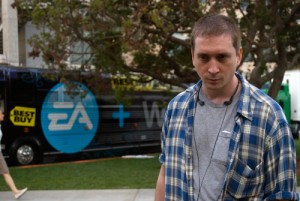
1. What inspired you to become a filmmaker?
Growing up with the idea that film directing is the pinnacle of creative labor. Movie production has it all – writing, visual aesthetics, theatrical performance, musical composition – and the director is the one who has complete control over it all – or so you imagine, when you’re a kid. Back then, you have no clue about what power studio execs and focus groups and “producers” (and friends and offspring of the producer) have over the final cut, how much committee-think crap is infecting the process from every side. You find this out, and in the meantime you’ve seen a couple thousand movies over the years, and now the the plot conveniences and three-act script strategies are becoming so painfully obvious – because they make the safe choices that put the asses in the seats last time, and the time before that, and the time before that. Then you suddenly see a poster for Mr. Popper’s Penguins on the side of a bus, and it’s like accidentally stepping on a dead mouse in bare feet – you can’t help flinching in disgust. But out on the perimeter, there were always such heroic struggles to do something new with film, stuff you’d never even hear about in film school – like Svankmajer and Norshteyn. The Brothers Quay shorts.
But so many “kid filmmaker” types eventually get themselves to Hollywood – and end up working those P.A. jobs where they fetch frozen yogurt for the assistant-to-the-assistant cameraman – the disposable worker bees that Hollywood uses up like Kleenex. I grew up in L.A., and it’s an amazingly hard-to-summarize town, but the place is definitely littered with the bones of the poor bastards that were going to make it big someday, waiting around for their green light, literally waiting out their lives as they sought someone else’s permission to be in movies or TV, or to direct a movie. Living in and around Hollywood eventually leads you to the truth: really being a filmmaker is to be the guy or gal who is going to do their damn films, period, no matter what anyone else says. Like Christopher Nolan with his first flick. You don’t wait for money or connections or studio permission.
So, in that sense – though this might seem circular reasoning – a source of inspiration is the internet itself, and the ability to do whatever bizarre (zero-budget) epic you want, and then self-distribute it….directly from your head to a worldwide audience, no committees or focus groups or fatuous execs allowed.
2. Did you always want to write and direct, or was acting your first love?
I got backed into a corner with acting – I was engineering stealth theater pieces in college, pulling these weird tech hoaxes in front of big crowds, and I couldn’t ask someone else to do it for me, I had to get over my fear of public speaking and just get it done. We filmed these hoaxes and put them on the internet with the title “GRRF” for awhile, then the genre got an official name by my fave professor – Brett Stalbaum – he called it “Demo Noir”. Because I was an older-looking student in college, I could have a university professor – usually Brett – bring me into their freshman class as if I were a researcher or software engineer, invited to give a guest lecture and demonstrating my latest tech bits. What the students wouldn’t know is that it was actually all a scripted theater piece, totally memorized and rehearsed, and that the “software” it looked like I was using on my laptop was actually just a secret DVD playing off to the side, with me timing my movements and emotional-crisis points to the video behind me as if I was using my laptop to manipulate it the whole time, slowly going into bitter despair from all the faked technical glitches. I kept changing the backstory for these pieces – the last one was that I was demo’ing a video game made by a student, “Ben”, who had just died of leukemia. And the game turns out to be so horrible, I start getting really impatient with this dead kid’s project. That one was called “The Last Lecture”, we’ve got the whole thing up at Lumalin.com, if anyone’s curious.
So to make these Demo Noir pieces happen, and to fool these big university audiences, I thought I needed to learn how to act. It turned out that all I really needed to learn was how to be a great liar. So I decided to carry that idea of “realistic acting is just great lying” into my movies. Someone like, I don’t know, Anthony Hopkins has much more going on than just lying, obviously, so it limits your range somewhat. But I never thought I’d end up acting – I just started doing projects and movies that I didn’t think I could convince anyone else to do, I’m kind of shy in that direction. So I just did it myself. Luckily, I turned out to have enough sociopathic tendencies in me to simulate emotional meltdowns, like crying on cue.

3. Your films are of the odd variety, to say the least. What’s the purpose behind this?
There’s really one reason for independent film to exist: to do the kinds of movies that the studios and networks wouldn’t touch with a gondola pole. I saw so many film students trying to do a zero-budget Pulp Fiction, or a zero-budget Dark Knight, I’ve lost count. At the indie level, we’re all getting a chance to do the odd films that plague our brains, without having to justify them to execs or financiers. In a sense, it’s the chance to make the films that you wish YOU had discovered already existing in the world. If someone else had done “Only Interstellar Pinball Lives Forever”, and I had stumbled across it, it’d be like a frying pan had whanged me on the head – like THAT’S the kind of puppet-pinball-death-obsession-satire-hybrid movie I’ve always wanted to experience. That’s what indie film is for – to explore all the possible permutations of new, untried, bizarre cinematic notions without them getting screwed with by “professionals”, i.e. studio people and their damn focus groups.
Also, films nearly always tend to be a vicarious action experience, or vicarious relationship experience, something physical or conversational like that. Something everyone can understand, more or less. I’ve been aiming for a vicarious mental experience of sorts, placing the audience in someone else’s stream of thoughts. Instead of linking events, it’s linking thoughts – which then cause the events, instead of the other way around. It gives you a lot of freedom during the writing phase, but endless tangles and extra headaches during post-production. I couldn’t say if the approach is either easier or harder.
4. What’s it like to run your own film company?
Hmmmm. Let’s just say that whatever stress and poverty and solitude is involved, I still wouldn’t trade it for any other arrangement. If you ever read biographies of people like Disney – not that I’ll ever manage a fraction of that empire – there are just some folks who have to start their own dream, however small and desperate – because it’s theirs. Someone who goes and works for a company, like that nest of vipers known as Apple, or Paramount Studios, or Sony – those companies were someone else’s dream. You’re climbing another man’s ladder. If you have to have your own dream, you take the bullet of hard times and extra struggle – but the victory or loss is all yours, and some folks need that complete risk. But we all have to follow the script of our own natures. I have friends who got jobs with big media companies, and are very comfy, and have the kind of fecking spending money I can only daydream about – and there are times I crave that kind of comfort and stability, but then I wouldn’t know what I’m living FOR – I’d be one of the many, many folk who are telling themselves that they’ll do what they really want to do SOMEDAY….as the years roll on….that’s more horrifying to me than poverty. Poverty’s easy. And I’d rather just have a job making sandwiches for a living & do my filming on weekends. Yeah, when it comes to getting paychecks, I’d rather it have nothing to do with media. I shudder at the thought of being stuck in the middle of all that celebrity-based media assembly-line publicity-department crap, watching all the Shrek 5 billboards going up around me. It’d make me so damn bitter. I’m bitter enough as it is.
But the worst part is not having any money left over to promote anything. You just have to hope your stuff catches on. I did a Facebook page for Summer of the Chew Toy Soul, but I don’t know what the hell I’m doing, or what that page is for, or what kind of Facebook strategy even exists for existential death-obsession puppet satire cinema. I’m hopeless in that area. Utterly hopeless.
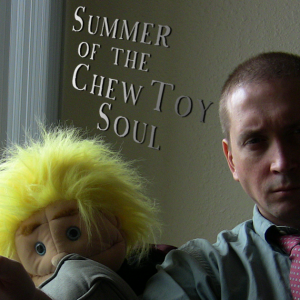
5. Dobo the Puppet has been in every one of your films. Do you look at him as Lumalin’s mascot, a la Mickey Mouse?
I was almost ready to say nope, he actually hasn’t been in all of them – but you’re right, now that I think about it, he’s managed to be in all four Lumalin flicks – and several shorts, too. Only the last two have elevated him to the lead actor. But Lumalin didn’t start out to do puppet movies, it just went that way for the time being, so he doesn’t have official mascot status – but definitely “alter-ego” status. He was originally a Sunday School puppet, to be used in churchy things to tell kids how awesomely cool-a-riffic and rockin’ Jesus is, et cetera. He’s still got that sweater on with “God’s Got a Plan For Me” written across the front – but his face was accidentally stitched in such a way that he always looks anxious and completely unsure of things. Honestly, I’ve never seen such an existential face as Dobo’s. It’s a perfect distillation of philosophical worry. He appears to be thinking that God’s plan is going to involve something rather unexpected and nasty.
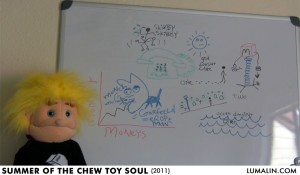
6. In your latest film, “Summer of the Chew Toy Soul”, Dobo spends his summer wishing for a workable Nintendo 64. Do you have any fond memories of the system, or any video game system for that matter?
Damn, where do I even begin? Okay….had some great SNES addictions, like Arcana, and the top-down Zelda. And Super Turrican – incredible tunes on that one. Then PSX marathons of Colony Wars, Disruptor, Die Hard Trilogy – and, I admit, the Spyro games. Had an N64, really got into Body Harvest and Beetle Adventure Racing. And Blast Corps. And the two Battletanx games. But then the biggest addictions came on the PS2. SSX Tricky is still my personal video crack.
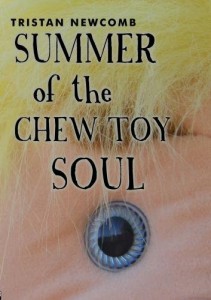
7. This is clearly Dobo’s worst summer. What would be yours?
Working at Six Flags anything, and then trying to sleep in an apartment without air conditioning, the screams of roller coasters filling my brain, knowing I have to do it again the next day….it’s never happened to me – just imagining.
8. You’ve also written a fantasy novel, “Fairfaxe”. Are you planning on writing any more?
I’d love to write sequels to that damn thing until cows make liquor – but the first one would have to click with an audience first – it’s too lonely an enterprise if there aren’t any readers actually waiting for more of it. And I have no idea if there’s a market for adventure-fantasy novels written specifically for bitter elitist cynics and compulsive overthinkers (which the main character suffers from). But like Gretsky said, the only shots he missed 100% of the time are the ones he didn’t take – so I had to finally release the book to find out. I also thought the pair of canine ears on the cover would alert everyone to the fact that it’s also a book suitable for smart childfolk, but I suppose I need to broadcast that fact a bit better. Ha – that’s a better question: would anyone buy a book for their kid knowing that it celebrates very severe individualism, extremely harsh skepticism, and utter distrust of others? I think all kiddie books are generally about getting along. Even Roald Dahl bent that way by the tale’s end, most of the time, I think. Hmmm. I might be wrong about that.

9. What is your favorite film that you’ve made so far?
“Only Interstellar Pinball Lives Forever” – because it’s also a love-letter to pinball machines, which I had such a desperate infatuation for in my youth. Every time I show a pinball machine on screen, I also list the year, designer and lead artist – a rather unorthodox thing to do in a fictional film, but those people simply damn well deserve it. Also, it ambles through the entire intellectual tangle I had about the possibility of living forever as a transhumanist digital consciousness – and the conclusions the characters come to are roughly my own. And, like the very end of that film, the confusion of whether or not to keep those conclusions, or entirely dismiss them and rethink the whole thing over and over, is probably a permanent fixture of my own perpetual doubts, and doubting of doubts.
Also, I got to dedicate the film to an uncle of mine that I never met – who died in a submarine in World War II. The cemetery sequence we filmed was actually in the same cemetery where his memorial is. We didn’t ask permission, we just got out of sight of the guards, started setting up, began filming, and just waited for them to bust us. They never did.
But I realize OIPLF is a definitive example of a love-it-or-hate-it flick. There’s really not much middle ground. The people that rip it apart do so to shreds, and the folks that love it almost adopt the movie as a new best friend. All I can say is that, of all the movies and shorts I’ve done, I’ve never concentrated so hard on every little detail, word, concept and transition as I did on that movie. I was aiming for a complete cerebral connection to anyone else with a caffeinated-intellect fear-of-death mindset that also have constant pinball and Sesame Street fixations from their youth hanging around. And I was hoping that any outsiders to those predispositions would get a kick out of the immersion into such an “other” way of thinking, but it’s hit and miss. Love or loathe. And the other best thing about OIPLF is that some folks who dug it ended up writing me about it, and I’ll probably be collaborating with them in the future. Fingers crossed.
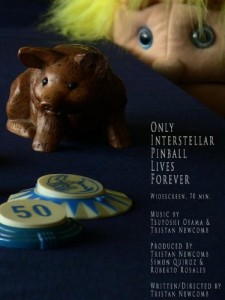
10. Do you have any advice for aspiring filmmakers?
To paraphrase the most hardcore filmmaker I know of, Werner Herzog: you don’t make a movie with money, you make it with your hands, feet and brain. Never put anyone or anything in a position of power over making your movies. If you can’t afford the movie you really want to do, then think of a movie you CAN afford and do that one first. And rewrite every line, scene and concept at least three times over – it minimizes the “what the hell was I thinking?” horrors that filmmakers inevitably suffer down the road. And don’t let anyone tell you that you need Final Cut Pro, even if that person is a professor. I used Final Cut Pro, then Premiere, then switched to Vegas Pro – and I think Vegas is the best (with Premiere a close second). I know folks who use Avid, Pinnacle Studio, even Windows Movie Maker – use whatever you’re comfortable with. Anyone who tries to mandate a particular piece of software, or hardware brand, or even a camera model, they’re your enemy. Also, make sure to do one rewrite pass on your script while either hungover or sleep deprived – it really ramps up your bullshit detector.
All of Tristan Newcomb’s films can be found at his website: http://www.lumalin.com/
